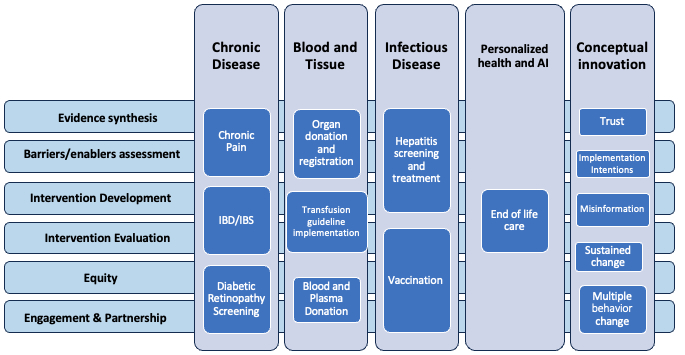Labs and Groups
Presseau Group
Presseau Group
Team Leader

Justin Presseau
Senior Scientist, Methodological and Implementation ResearchWhat We Do
The Presseau Group is multidisciplinary team of research staff and trainees focused on rigorously drawing from - and contributing to - behavioural and implementation science to support the health and well-being of patients, the public, and supporting health providers in the health care system to provide high quality care. We do so in partnership with interest holders including patients, people with lived experience and health system decision makers and health providers, and with a strong commitment to equity-focused research.
Our team draws upon multiple methodological approaches (e.g., evidence syntheses, qualitative methods, priority-setting methods, surveys, and randomized trials), spanning a number of different clinical areas including chronic disease, blood and tissue, infectious diseases and personalized health. Further, we are committed to developing theory, methods and evidence in conceptually novel areas including building and rebuilding trust, the effectiveness of implementation intentions for behaviour change, strategies for addressing mis/disinformation, understanding and supporting sustained change, and moving from single to multiple behaviour change approaches.
We support multidisciplinary training opportunities including undergraduate, graduate and post-doctoral supervision through affiliations with the University of Ottawa School of Epidemiology and Public Health and School of Psychology, as well summer studentships and practicum placements.

Our team draws upon multiple methodological approaches (e.g., evidence syntheses, qualitative methods, priority-setting methods, surveys, and randomized trials), spanning a number of different clinical areas including chronic disease, blood and tissue, infectious diseases and personalized health. Further, we are committed to developing theory, methods and evidence in conceptually novel areas including building and rebuilding trust, the effectiveness of implementation intentions for behaviour change, strategies for addressing mis/disinformation, understanding and supporting sustained change, and moving from single to multiple behaviour change approaches.
We support multidisciplinary training opportunities including undergraduate, graduate and post-doctoral supervision through affiliations with the University of Ottawa School of Epidemiology and Public Health and School of Psychology, as well summer studentships and practicum placements.

Research Activities
Dr. Presseau's research program operates at the intersection between behaviour science and implementation science focusing on synthesising, developing, and evaluating interventions to improve healthcare and health through supporting behaviour change in those providing healthcare, and in patients and the public. He is a faculty member of the Centre for Implementation Research at the Ottawa Hospital and leads the Psychology and Health Research Group.
Selected Publications
For full list of up-to-date publications, see